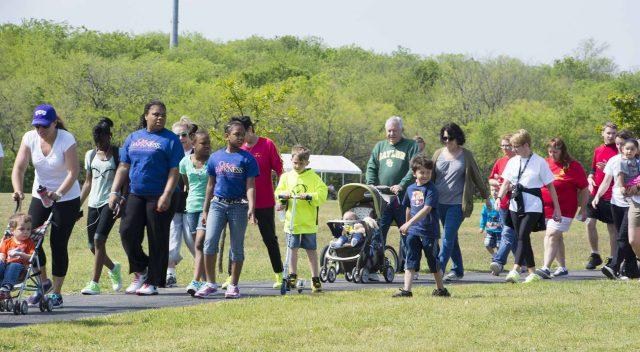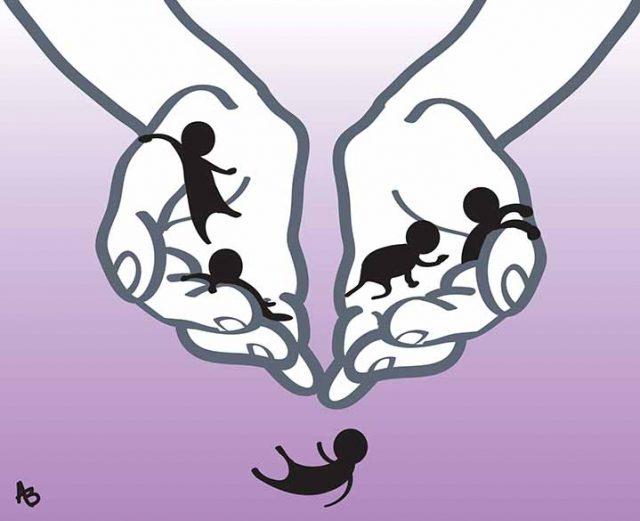By Karen Rios/ reporter

Collegian file photo
Out of the Darkness is more than just a walk.
Beyond the charity race are people who want to prevent suicide and help those in need.
Former student Jessica Caudle brought the race to TCC and has been an advocate for it since day one. It’s personal to her.
When she was 7, Caudle’s father ended his life. Later on, she tried ending her own.
When her father died, Caudle said her family didn’t really talk about what happened. But word got around.
Six years later, a police officer, her best friend’s father, asked if she wanted to read the police report over her father’s death.
“I needed answers. I wanted answers,” she said. “I didn’t want the answers I received, but at the same time, I wanted closure, and my friend’s dad knew that.”
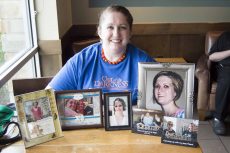
Karen Rios/The Collegian
Caudle said some people still can’t accept that her father died by suicide. She was greatly impacted by losing her father but never talked about her pain.
“As far as processing what happened, that didn’t happen until recently,” she said.
At 17, Caudle left home and traveled all over the U.S., ending up in Los Angeles. She got jobs on Hollywood sets as an extra or a stand-in. As far as everyone was concerned, she was “living the life.”
Caudle turned 21 during that time and began to drink — a lot.
“And that’s when things turned for the worst,” she said.
Caudle struggled with sexual identity at a young age. When she fell in love with a girl in California, she thought, “Oh, my god, I’m gay.”
As she struggled with coming out, she was also battling depression. She turned to drugs and alcohol to aid her emotions.
“I struggled in silence. I didn’t tell anyone what I was doing to myself,” she said. “I was disappointed in myself for falling into addiction.”
Caudle used “uppers” and would get so high that she wouldn’t sleep for days. When she came down, negative thoughts poured in. Feeling the shame and the guilt after bottoming out on drugs, she tried ending her life.
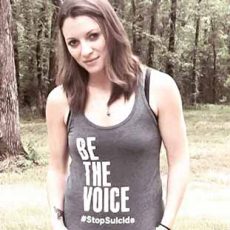
Photo courtesy Jessica Caudle
“I tried about four times,” she said. “As for the thoughts, they were daily.”
A couple of times when she tried to end her life, she would wake up after trying. Other times, people were around and saved her from her thoughts.
“It is a never-ending cycle of shame,” she said. “I would be angry with myself. There was a fear that I would actually do it.”
Her unborn son turned her life around.
“When I found out I was pregnant, I walked away from the drugs. I think it was my saving grace,” she said. “I finally worked through my painful past with a licensed professional counselor and found a therapy/medication regimen that worked for me.”
Caudle’s story motivated her to volunteer for the American Foundation for Suicide Prevention in 2013. In 2015, she was asked to be part of the North Texas chapter’s board of directors. She will travel to Washington in June to rally the group’s cause.
When Caudle first brought the Out of the Darkness walk to TCC, she met Sarah Hope, who lost her sister, Chappell, in 2010 because of suicide. Chappell Hope was a SE lab assistant.
“Even though she was beautiful on the outside, she was very hurt and broken on the inside,” Sarah Hope said.
At a young age, Chappell Hope got involved with the wrong crowd, started using drugs and also struggled with body image issues. Sarah Hope read some of her sister’s journals and found out she had been molested as a 4-year-old and raped as a 14-year-old.
In some cases, death by suicide comes as a surprise. In other cases, there are signs.
Sarah Hope said her sister at one point was a 5-foot-10-inch woman weighing about 95 pounds.
“She became an anorexic, and you could tell she was going through a difficult time,” Sarah Hope said. “After our grandmother died, it got worse. She started dyeing her hair a lot and got like 20 tattoos.”
Sometimes when Sarah Hope would ask her sister why she would try to end her life, Chappell Hope would be unaware of what she tried to do.
“I think I read somewhere, ‘People who die by suicide aren’t trying to end their life. They are trying to end their pain,’ and I think that is so true,” Sarah Hope said. “I know if Chappell could still be here, she would want to be here.”
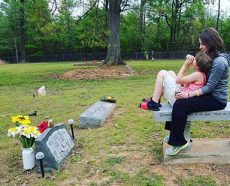
Before her last attempt, Chappell Hope gained weight and started getting healthy again. To her family and friends, this was a positive turn.
“It was like Chappell was back,” Sarah Hope said.
On May 20, 2010, while Sarah Hope was out of town, her sister ended her own life at the age of 30.
“It was weird. She was just gone,” Sarah Hope said. “It seemed like she would always come back.”
Chappell Hope told a peer that day that she was going to take her life. The person didn’t take it seriously.
“Anytime someone says they are going to kill themselves, you should always take it seriously,” Sarah Hope said.
Sarah Hope has spoken out about her sister and promotes organizations for suicide prevention to help stop others from taking their lives.
“I think if Chappell would have had ASFP when going through all that, I think it would have helped her maybe,” Sarah Hope said.
As a memorial, she makes shirts that read “Chappell’s Hope” and have a butterfly image, an impression of a tattoo she had, printed on them, so she can pass out to people and wear during suicide prevention walks.
Chappell Hope’s favorite quote was, “Just when the caterpillar thought the world was over, it became a butterfly.”
TRE surgical technology director Cindy Mask co-chairs the event with Caudle.
Mask learned Caudle’s story while Caudle was in the surgical technology program. Mask has also seen a variety of students who struggled with thoughts of suicide.
She watches for signs in her students like grades dropping, weight losses and personal hygiene changes. When she sees students who look like they are having a tough time, Mask said she tries to motivate them with positive reinforcement.
“Number one, you have to listen,” she said. “You’ll find that people give those people answers, but that’s not what they need. Just ask them, ‘How are you doing?’ And just listen.”
She urges students to find someone to talk to if they are in pain. Every campus has counselors trained to help people through their struggles, Mask said.
“There is a law that if you know someone who is going to hurt themselves, you have to report it to the police,” she said. “Here on campus, we call the CARE Team.”
Caudle, Hope and Mask hope being open about suicide will break the stigma of suicide one conversation and one story at a time.
“Life is full of struggles but also full of wonders,” Hope said.






















